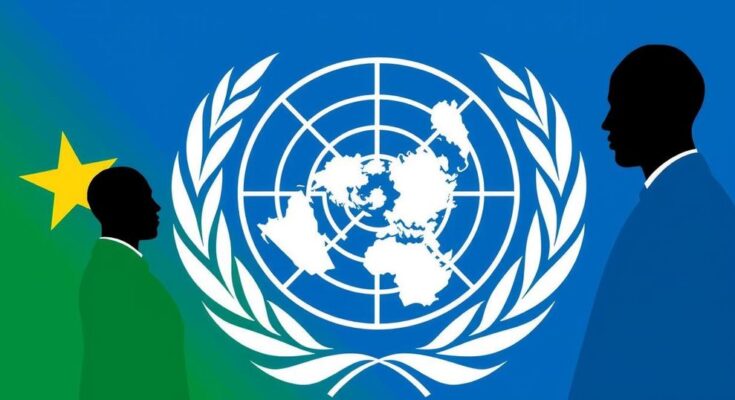Russia vetoed a UK-backed UN resolution seeking a ceasefire in Sudan, prompting outrage from the UK and US. The ongoing civil war has resulted in tens of thousands of deaths and millions displaced. The resolution aimed to halt hostilities between the army and the Rapid Support Forces (RSF), but failed to pass due to the Russian veto, with Sudanese representatives expressing dissatisfaction over the draft’s contents.
In a vehement display of dissent at the United Nations, Russia exercised its veto power to block a ceasefire resolution regarding the ongoing civil conflict in Sudan, which has persisted for 19 months and resulted in devastating humanitarian consequences. The UK-backed resolution, supported by Sierra Leone, aimed to halt hostilities between the Sudanese army and the Rapid Support Forces (RSF), advocating for immediate dialogue to establish a national ceasefire. British Foreign Secretary David Lammy described Russia’s action as a “disgrace,” emphasizing the need for urgent intervention amidst soaring fatalities and displacement, which has seen over 11 million individuals forcibly removed from their homes.
The protracted conflict commenced in April 2022 as the army and RSF engaged in a brutal power struggle. The humanitarian crisis has been exacerbated, with millions at risk of famine according to aid workers, who have criticized the UN for its sluggish response. Several UN Security Council members expressed unanimous support for the draft resolution, yet the Russian veto nullified its passage. U.S. Ambassador to the UN Linda Thomas-Greenfield criticized Russia for obstructing essential humanitarian efforts, suggesting its actions are self-serving, while Russia’s representative accused the UK of meddling in Sudan’s internal affairs.
Amidst the contentious UN session, Sudanese officials voiced their grievances regarding the draft’s content, arguing that key amendments, including strong condemnations of external support for the RSF and the designation of the RSF as a terrorist organization, were absent. Both factions involved in the conflict face allegations of grave human rights abuses, raising concerns about potential war crimes. UN discussions reflect the intricacies of international politics and their implications on the resolution of humanitarian crises.
The ongoing civil war in Sudan, which ignited in April 2022, has sparked a humanitarian catastrophe, leading to tens of thousands of deaths and displacing over 11 million individuals. The conflict primarily involves a struggle for power between the Sudanese army and the paramilitary group known as the Rapid Support Forces (RSF). As the violence escalates, the humanitarian situation has become dire, prompting international calls for a ceasefire and immediate negotiations. The UN Security Council’s recent resolution initiative aimed to serve as a framework for peace but ultimately fell short due to geopolitical tensions and the resistant stance of key member states, particularly Russia. This scenario exemplifies the complexities of international diplomacy, especially concerning humanitarian interventions in conflict zones.
In summary, the recent confrontation at the UN regarding Sudan underscores the delicate interplay of international politics and humanitarian advocacy. The veto by Russia, opposed by numerous other UN member states, highlights significant divisions over the approach to the Sudanese conflict. As the humanitarian crisis continues to deteriorate, the urgency for collaborative global action becomes increasingly critical. The resolution’s failure reflects not only the obstacles imposed by international relations but also the profound implications for the millions affected by the violence in Sudan.
Original Source: www.bbc.co.uk




